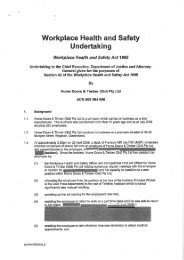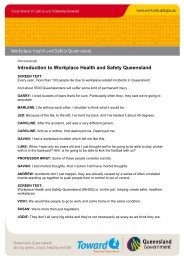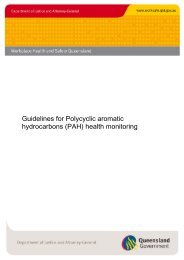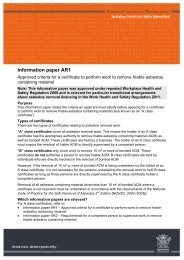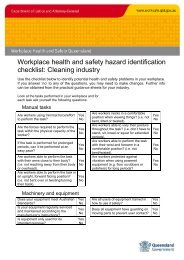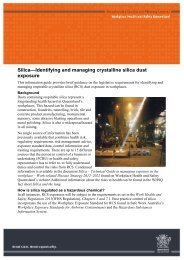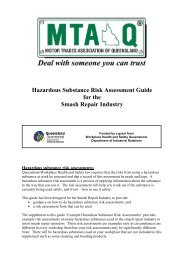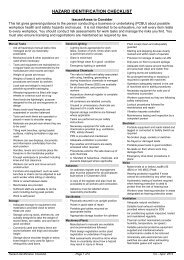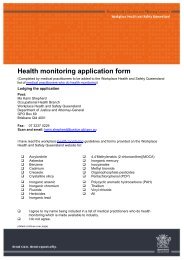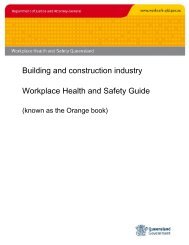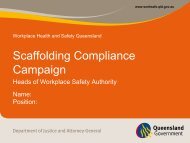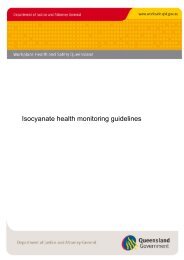A guide to the Dangerous Goods Safety Management Act 2001
A guide to the Dangerous Goods Safety Management Act 2001
A guide to the Dangerous Goods Safety Management Act 2001
Create successful ePaper yourself
Turn your PDF publications into a flip-book with our unique Google optimized e-Paper software.
6.6 Notification<br />
The DGSM <strong>Act</strong> requires <strong>the</strong> occupier of a Large DGL <strong>to</strong> notify <strong>the</strong> Department of Emergency Services of<br />
<strong>the</strong>ir existence. This obligation <strong>to</strong> notify applies <strong>to</strong>:<br />
• an existing Large DGL; and<br />
• a new Large DGL.<br />
6.7 Enforcement<br />
Several agencies are involved in <strong>the</strong> enforcement of <strong>the</strong> DGL requirements of <strong>the</strong> DGSM <strong>Act</strong> legislation.<br />
The Division of Workplace Health and <strong>Safety</strong> (DWHS) in <strong>the</strong> Department of Industrial Relations will have<br />
enforcement responsibility for stated dangerous goods (classes 2, 3, 4, 5, 6.1, 8 and 9) and combustible<br />
liquids. This role will complement its traditional role in relation <strong>to</strong> <strong>the</strong> Workplace Health and <strong>Safety</strong> <strong>Act</strong> 1995.<br />
Local Government will continue <strong>to</strong> have responsibility for licensing of flammable and combustible (F&C)<br />
liquids s<strong>to</strong>rage, and <strong>the</strong> enforcement of licence conditions.<br />
The Gas Examiner’s Officer (Department of<br />
Natural Resources and Mines) has responsibilities<br />
in relation <strong>to</strong> Class 2.1 dangerous goods<br />
(flammable gases) which will supplement <strong>the</strong>ir<br />
existing powers under <strong>the</strong> Gas <strong>Act</strong> 1965.<br />
6.8 Directives<br />
Authorised officers can direct an occupant <strong>to</strong><br />
conduct a risk assessment and, if <strong>the</strong>se officers<br />
find <strong>the</strong> risk is unacceptable, <strong>the</strong>y can direct <strong>the</strong><br />
occupier <strong>to</strong> reduce that risk. In extreme circumstances,<br />
authorised officers will be able <strong>to</strong> direct<br />
that operations be suspended. In <strong>the</strong> case of major<br />
accidents, <strong>the</strong> authorised officer can direct that <strong>the</strong><br />
site be isolated.<br />
Authorised officers will have <strong>the</strong> power <strong>to</strong> issue<br />
directives on a range of safety matters regarding<br />
<strong>the</strong> s<strong>to</strong>rage and handling of dangerous goods at a<br />
DGL.<br />
The <strong>Act</strong> requires <strong>the</strong> occupier of a DGL <strong>to</strong> keep an<br />
accurate record of all directives given by an<br />
authorised officer.<br />
A person who is given a directive by an authorised<br />
officer may apply for <strong>the</strong> directive <strong>to</strong> be reviewed.<br />
Where <strong>the</strong>re exists a dangerous situation which needs <strong>to</strong> be dealt with without delay, an authorised officer may<br />
take, or cause <strong>to</strong> be taken, reasonable action <strong>to</strong> prevent, remove or minimise <strong>the</strong> danger.<br />
20




